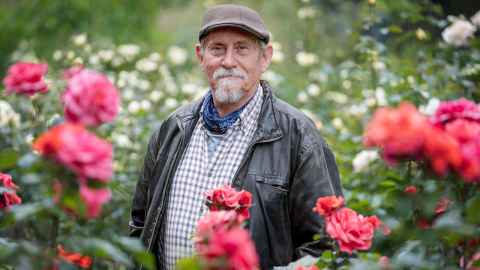Head gardener Stanley Jones says goodbye to his campus beauties
30 November 2023
After 14 years of beautifying the University of Auckland campuses, Stanley Jones retires in December. The man responsible for the garden vibe answers a few questions.

What is your proudest achievement?
I’m happy to have brought a more contemporary artistic approach to planting design. I like the idea of treating a bed of plants like a box of paints and arranging them according to the principles of abstract design. It includes unity, scale, balance, simplicity, variety, emphasis and sequence as they apply to line, form, texture and colour.
If you could take one plant from the University with you, which would you choose?
I love perennials. Perennial gardens evolve continuously through self-seeding and natural renewal without too much intervention.
Are there any new gardens under way on any of the campuses?
The revamped Building 201 on Symonds Street will now connect with Wynyard Street, so that area is being landscaped and will connect the two. The building itself also has rooftop gardens.
What is your favourite special garden?
The perennial garden along the pathway next to Alfred Nathan House, which runs from Princes Street. It’s not that old but has grown beautifully and there’s always something special to look at.
Which do you consider the most spectacular plant at the University?
The tree collection. There are more than 400 trees around the City Campus and most are mature and more than ten metres tall. As well as being beautiful, they’re important in carbon offsetting.
The best goal is to establish a community of plants that are self-sustaining and need minimum intervention.
During lockdowns, who looked after the University gardens?
Our gardeners were able to maintain all the campus gardens during lockdowns. It was quite a peaceful time for them!
Does the University have any problem plants?
No problems, but as construction takes place some gardens can be lost.
Many of the plants tie in with our cultural history … trees planted by royalty for example. If King Charles visited, could he plant a tree?
Yes, we still try to get trees planted by notable people. Three vice-chancellors have also planted trees since the University was established.
What have you learned in your time here?
I’ve become aware when walking through the gardens each day that they reflect a sense of simplicity, modesty, naturalness, everydayness and imperfection, as well as silence and balance. Our gardens are subtle and have unobtrusive beauty. Engaging with the gardens is effortless and pleasurable, and more people should try it.
I always consider the gardens as part of the framework of the University urban scape so they should be in harmony with the buildings and hardscape while also promoting an atmosphere of tranquillity and unity. I wish people would look up from their phones and enjoy the gardens more.
What do you grow in your garden at home?
We have an orchard, vegetables, a perennial garden, a medicinal garden and a herb garden.
What are your plans for retirement?
Creating new gardens in my Eketahuna home, painting and woodwork, as well as growing fruit and vegetables.
How should people nurture nature?
I’m an advocate for sustainable horticulture so I look at the best ways to optimise the health of your plants by using the absolute minimum of fungicides and insecticides. Also to practise less cultivation and to make sure you apply compost and organic mulch whenever you can. The best goal is to establish a community of plants that are self-sustaining and need minimum intervention.
What message do you have for your staff as you depart?
I would like the grounds staff to engage with more people through the likes of garden tours, exhibitions and articles. They do already promote the gardens constantly by making the community aware of the biodiversity and the importance of plants and their connection to life. The gardeners will keep providing beautiful garden spaces to uplift the spirits of staff, students and visitors and connect them with plants and the role plants play in their lives. This is all good to improve people’s overall mental well-being.
What message do you have for people on our campuses?
I would like staff and students to make time to walk through the gardens on the way to work and to experience the peace and harmony of the gardens. Try it!
Anything else you’d like to say?
Life is short; enjoy each day as much as you can. Oh, and mulch!
This Q and A first appeared in the December 2023 UniNews.